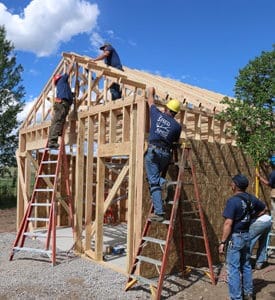 There are few sights more awe-inspiring than thousands of elk gathered in a valley bounded by the rugged Teton Mountains carving the Wyoming sky.
There are few sights more awe-inspiring than thousands of elk gathered in a valley bounded by the rugged Teton Mountains carving the Wyoming sky.
Located in Jackson Hole, Wyoming, the National Elk Refuge has been a winter feeding ground for the Jackson elk herd since 1912. Though established for the elk, the refuge also serves as a home for bison, pronghorn, wolves, moose, deer, bighorn sheep as well as a variety of migratory birds and small mammals.
Maintaining the refuge habitat and managing such a large elk herd is a costly affair, but luckily, the bulls pay room and board in the form of the valuable antlers they drop, often called sheds, before leaving the refuge for their summer range.
Through a partnership that’s been in place for almost 50 years, approximately 200 youth, leaders and parents from the Jackson District Boy Scouts help the refuge staff collect the antlers each spring. Scout leaders then sort, bundle, weigh and tag the antlers in preparation for an annual public antler auction the local troops organize the Saturday before Memorial Day weekend.
This year, the antlers tipped the scales at more than 11,000 pounds and raised approximately $175,000. Of the money raised, 75 percent goes to the National Elk Refuge for habitat enhancement and research and 25 percent is given to the Jackson District Boy Scouts.
Where are thousands of pounds of antlers worth hundreds of thousands of dollars stored from the time they are collected until late May? That’s a challenge the National Elk Refuge has grappled with for years. The antlers are stored in several locations, displacing refuge equipment and storage space for employees. The staff work around the antlers until the time for the auction draws near, and the storage space has reached its capacity.
“We’ve always known there was a need to get all the antlers in one secure facility, but there were so many other priorities, and money is tight,” Dippel said.
That won’t be an issue next year, thanks to a group of IBEW Local 322 volunteers led by a Local 322 organizer, Bruce Johnson.
 Johnson had long been interested in organizing a USA conservation project, and after he connected with USA staff at the 2015 IBEW Membership Development Conference, the USA reached out to the Department of the Interior (DOI) to identify Wyoming conservation projects in need of manpower. Among those projects was the construction of a 20×26 foot storage shed with electric and heat to securely store the antlers. It was the ideal project, according to Johnson, who said most of the volunteers are avid elk hunters like him.
Johnson had long been interested in organizing a USA conservation project, and after he connected with USA staff at the 2015 IBEW Membership Development Conference, the USA reached out to the Department of the Interior (DOI) to identify Wyoming conservation projects in need of manpower. Among those projects was the construction of a 20×26 foot storage shed with electric and heat to securely store the antlers. It was the ideal project, according to Johnson, who said most of the volunteers are avid elk hunters like him.
From the start, the project was a shining example of collaboration and community spirit. Lower Valley Energy donated the use of a line truck for the project, and a couple of its employees volunteered their time to relocate an existing gas line where the new shed was to be built. Before framing began, local Boy Scout Nathan Watson assisted Kevin Anderson, a scout leader and owner of Four Corners Concrete, Inc. in prepping and pouring the pad that forms the shed floor for his Eagle Scout service project.
Because IBEW Local 322 represents carpenters, painters, mechanics and other wage workers at Grand Teton and Yellowstone National Park in addition to inside electricians and linemen, the 35-40 volunteers who built the shed brought a diversity of skills and equipment to the project, and NECA contractors graciously donated the material to wire the structure.
Jack Shinkle, Historic Preservation Carpenter for the National Park Service, served as the advisor for the construction while Steve LaRosa, Heavy Equipment Operator for the National Park Service, handled logistics, job assignments and safety.
In addition to benefiting the National Elk Refuge and local Boy Scout troops, the new shed “is a way to showcase that union people are sportsmen and do care about the outdoors,” said Johnson, who explained that he often uses the outdoors as a way to reach across boundaries and find common ground with non-union electricians.
“This refuge would not get along without volunteers. We just don’t have enough staff to handle everything that is going on,” Dippel said. “We are honored to have the presence and expertise of the union volunteers. It’s just invaluable.”



